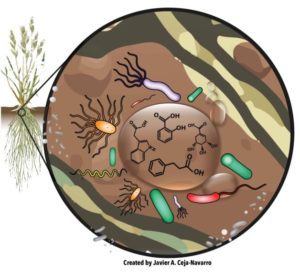 Researchers at Berkeley Lab and UC Berkeley have discovered that as plants develop, they craft their root microbiome, favoring microbes that consume very specific metabolites. Their study could help scientists identify ways to enhance the soil microbiome for improved carbon storage and plant productivity.
Researchers at Berkeley Lab and UC Berkeley have discovered that as plants develop, they craft their root microbiome, favoring microbes that consume very specific metabolites. Their study could help scientists identify ways to enhance the soil microbiome for improved carbon storage and plant productivity.
Just one gram of soil contains tens of thousands of microbial species. Scientists have long known that plants impact the composition of the soil microbiome in the area surrounding their roots by sending out chemicals (metabolites). Yet, little research had gone into the relationship between specific metabolites that plants release and the microbes consuming them. Now, a new study delving into this relationship has just been published in the journal Nature Microbiology.

Microbes that flourish in the area around plant roots take up specific organic acids from the root exudates. (Credit: Javier Ceja-Navarro)
The work was led by first author Kateryna Zhalnina, postdoctoral researcher in the Environmental Genomics and Systems Biology (EGSB) Division and Earth and Environmental Sciences Area (EESA), and corresponding authors Trent Northen, senior scientist in EGSB, and Eoin Brodie, senior scientist in EESA. With expertise in soil science, microbial and plant genomics, and metabolomics, their team explored these potential metabolic connections in the rhizosphere of an annual grass (Avena barbata) common in California and other Mediterranean ecosystems.
Other current or former Berkeley Lab scientists contributing to this studying were: Katherine Louie, Nasim Mansoori, Dominique Loqué, and Benjamin Bowen of EGSB; Zhao Hao, Ulisses Nunes da Rocha, and Ulas Karaoz of EESA. Shengjing Shi and Heejung Cho of UC Berkeley were also co-authors. The DOE Office of Science supported the research. The authors used a hydroponic setup at the Joint BioEnergy Institute, a DOE Bioenergy Research Center. This work was done in part through the DOE Joint Genome Institute Community Science Program. Read more in the Berkeley Lab News Center press release.




